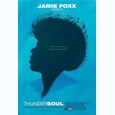Sometimes a story comes along that reminds us how a terrific music teacher can change lives. I recently watched Thundersoul, a documentary about the stunning rise of the Kashmere Stage Band, a Houston high school group that won national contests and toured around the world in the late 1960s and 1970s. To some, the story of the Kashmere band may be familiar, but this lovingly produced film probably never made it to a theater near you when released in 2010. It is worth seeking out as a rental or on cable. I smiled for 90 minutes straight while watching it.
The heart and soul of the Kashmere band was director, principal composer, and arranger Conrad Johnson (1915-2008), known to many as Prof. As a boy Johnson heard many of the top bands of the time, including Duke Ellington. A talented musician himself, Johnson performed with the Basie band and was offered a chance to tour with Erskine Hawkins. Johnson turned down a life on the road, choosing instead to build a career that allowed him to stay home with his family. Johnson began teaching in 1941 and continued for 37 years.
Watching the documentary, I could see that Johnson taught with a strong will and a kind heart. He led with exacting musical standards and emphasized the importance of tone first, knowing that once students had a taste of success, they would want to keep working. Some former students recall Johnson as the person who taught them how to be men. Although the Kashmere band consisted mostly of boys, the girls in the group also developed toughness. One recalled being teased that trombone was not a girl’s instrument, which only made her want to play it more. Prof said that he wanted to build groups marked by unity and perfection.
In addition to setting high standards for playing and behavior, Johnson developed an innovative musical repertoire that incorporated the elements of funk music at the time. At a time when many stage bands were replicating the big bands of earlier decades, Johnson concocted an intriguing brew of the typical big band instrumentation with the music and dance that was popular with his students. The results were electric, and the bands that competed against Kashmere did not know what hit them. Soon invitations to appear in Europe started arriving, and students who had never left Texas saw the world.
Much of the movie shows the effort by Kashmere alumni to reunite decades later for a concert honoring Johnson, who was then in his 90s. Some band members went on to teach music themselves; others had barely touched their horns in later years. All of the former students approached the task with the same unity that Johnson tried to teach.
To find out how the Kashmere Stage Band fared as they tried to recapture their former glory, you will have to watch the movie. I can say that the band shows great joy in expressing their appreciation for Johnson while he was still alive. One woman recalled from her days in Johnson’s class that “he reached into our soul and saw the future.” This is not a bad way to spend a career.





